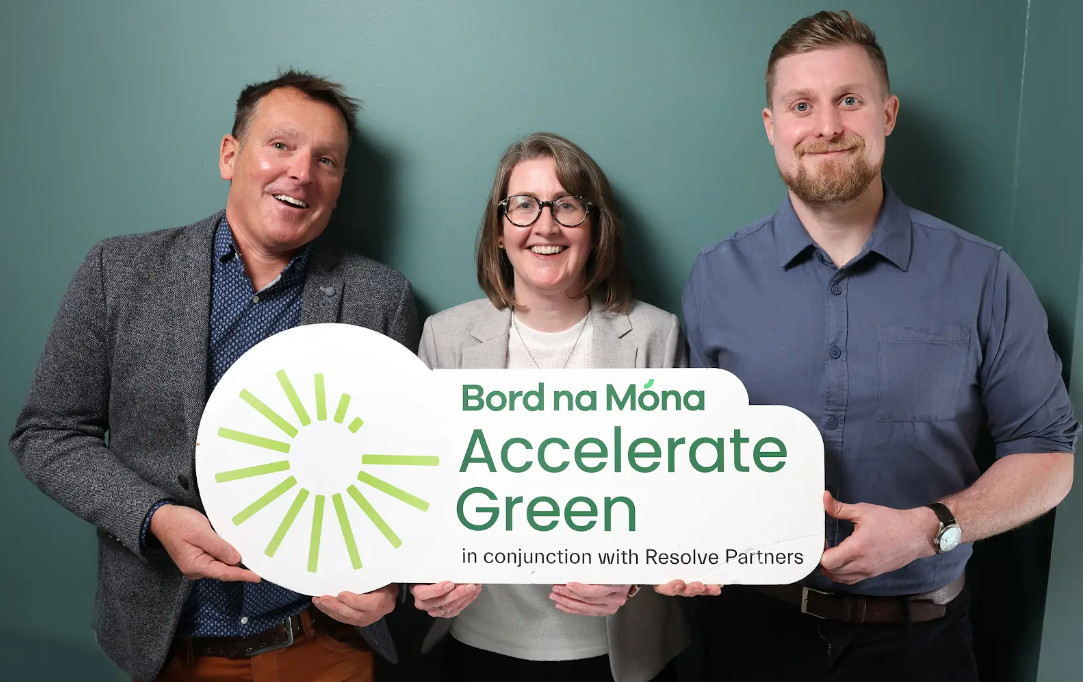Pictured (L-R): Barry Lupton, Fiona Nulty, and Kilian Murphy from Biosense.
BioSense is focused on using data science and technology to make biodiversity measurement more accessible, transparent, and actionable.
What inspired you to start your company?
I’ve always been passionate about nature and how we interact with it, but my journey into biodiversity started in a slightly unconventional way. I spent ten years working in architecture, where I saw firsthand how development and the built environment often overlook the natural world. That realisation led me to pursue a research master’s at Trinity College Dublin, where I focused on how biodiversity is considered in the development process.
During my research, I engaged with the team from O’Brien Landscaping who had been working with Nature+ in Trinity to solve similar problems. Together we started to see a huge gap—there wasn’t a clear, data-driven way to measure and improve biodiversity outcomes in projects. It felt like an area where science and technology could have a real impact, and that’s what ultimately led to BioSense. We connected with to our co-founder Kilian, to combine our multidisciplinary skills and build a solution that could bridge the gap between ecological research and real-world decision-making.
What is your core product/service offering and what gap in the market are you trying to address?
At BioSense, we’re focused on using data science and technology to make biodiversity measurement more accessible, transparent, and actionable. Right now, biodiversity monitoring is often inconsistent, expensive, and difficult to interpret for businesses, policymakers, and developers. We’re building a solution that reimagines how ecological data is collected and used—helping organisations make informed, science-backed decisions about their environmental impact.
We are working to make biodiversity assessments as clear and standardised as financial reporting. If businesses can measure and track their environmental footprint properly, they can actually take meaningful steps to improve it.
Is there a particular sustainability-related issue that your business is trying to solve?
Yes—our entire mission is centred around biodiversity restoration. There’s a growing awareness of climate change, but biodiversity loss is often overlooked, even though it’s just as urgent. Healthy ecosystems are essential for everything from food production to climate resilience, and yet we’re seeing rapid declines in species and habitats.
BioSense exists to change that. We want to give businesses and governments the tools to measure biodiversity effectively so they can actively work to restore and protect it. Our long-term vision is to create a world where nature is valued as an asset—something that’s monitored, reported on, and improved, just like financial or carbon data.
What motivated you to apply to the Accelerate Green programme?
We first heard about Accelerate Green through past participants and from attending the information evening. Every founder we spoke to said the programme was a game-changer for their business, and that really stood out to us.
For BioSense, the timing was perfect. We’re at a stage where we need to refine our product, validate our market fit, and think about scaling. The opportunity to learn from experienced mentors, connect with like-minded entrepreneurs, and gain insights from sustainability leaders like Bord na Móna was something we couldn’t pass up.
How important is professional networking for you as you grow your business?
It’s hugely important. No startup grows in isolation—having the right people around you can make all the difference. Whether it’s learning from other founders who’ve been through similar challenges, building partnerships with industry leaders, or getting access to investors, networking is a key part of BioSense’s growth strategy.
One of the things I love about being in this space is that there’s a real sense of collaboration. Sustainability is a shared challenge, and the more we can connect with organisations that want to make a difference, the more impact we can create.
What’s your long-term vision for the company?
Our vision for BioSense is to fundamentally change how we measure, report on, and improve biodiversity in order to improve outcomes for nature. Right now, we’re focused on building a robust, science-backed product that helps organisations integrate biodiversity into their decision-making. But in the long run, I want to see BioSense become the go-to standard for biodiversity data—just like financial audits or carbon reporting.
Beyond that, I want to see real, tangible improvements in biodiversity outcomes. Whether it’s more habitat restoration, better land management, or more species thriving in the wild, success for us isn’t just about building a great product—it’s about making a measurable impact

